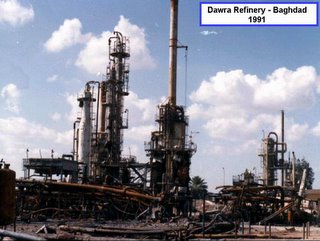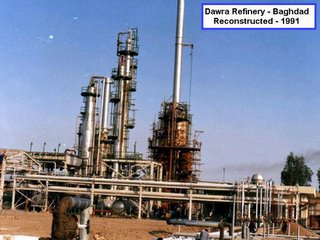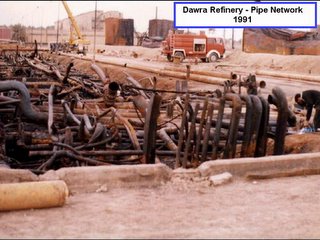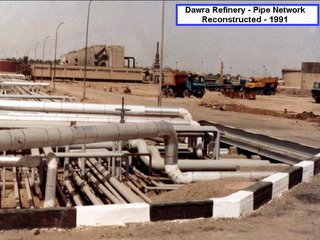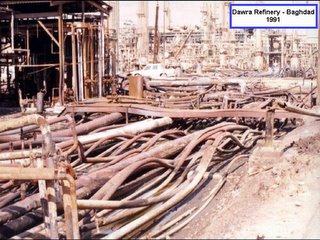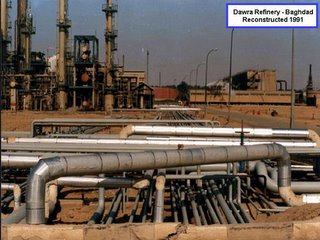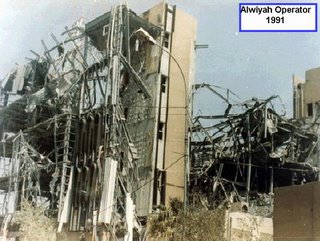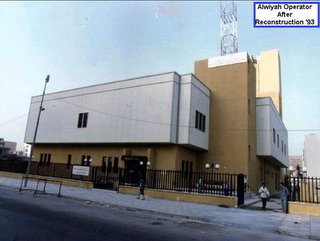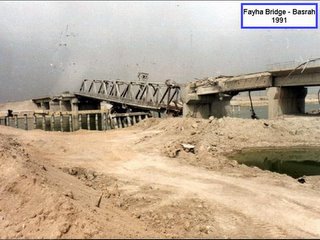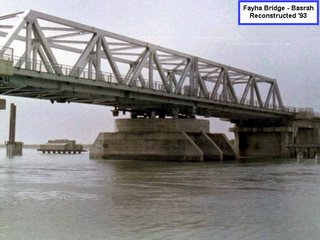Baghdad Burning
... I'll meet you 'round the bend my friend, where hearts can heal and souls can mend...
Wednesday, January 18, 2006
A Tribute to Iraqi Ingenuity...
January 17, 2006 marks the 15th commemoration of the Gulf War in 1991 after Iraq occupied Kuwait (briefly) in 1990. (Or according to American terminology, after Iraq ‘liberated’ Kuwait in 1990.)
For 42 days, Baghdad and other cities and towns were bombarded with nearly 140,000 tons of explosives, by international estimates. The bombing was relentless- schools, housing complexes, factories, bridges, electric power stations, ministries, sewage facilities, oil refineries, operators, and even bomb shelters (including the only baby formula factory in Iraq and the infamous Amirya Shelter bombing where almost 400 civilians were killed).
According to reports and statistics made by the “Iraqi Reconstruction Bureau” and the ministries involved in reconstruction, prior to the 2003 war/occupation, the following damage was done through 42 days of continuous bombing, and various acts of vandalism:
Schools and scholastic facilities – 3960
Universities, labs, dormitories – 40
Health facilities (including hospitals, clinics, medical warehouses) – 421
Telephone operators, communication towers, etc. – 475
Bridges, buildings, housing complexes – 260
Warehouses, shopping centers, grain silos – 251
Churches and mosques – 159
Dams, water pumping stations, agricultural facilities – 200
Petroleum facilities (including refineries) – 145
General services (shelters, sewage treatment plants, municipalities) - 830
Factories, mines, industrial facilities - 120
…And much, much more- including radio broadcasting towers, museums, orphanages, retirement homes, etc. While the larger damage- damage to dams, bridges, warehouses, ministries, food silos, etc.- was done by warplanes and missiles, the damage to smaller facilities was caused largely by vandalism in the south of the country and in areas like Kirkuk. In the south it was mainly the work of the “intifadah” which was initiated by the ‘tawabin’ or “The Repentant” who infiltrated the south from Iran and found supporters inside of the country. (Many of the ‘Tawabin’ are known today as Badir’s Brigade.)
What happened in the south in 1991 is similar to what happened in Baghdad in 2003- burning, looting and attacks. The area fell into chaos after the Republican Guard was pulled out to different governorates for the duration of the war. Meanwhile, the US was bombing the Iraqi army as it was pulling out of Kuwait and the Tawabin were killing off some of the Iraqi troops who had abandoned their tanks and artillery and were coming back on foot through the south. Many of those troops, and the civilians killed during the attacks, looting, and burning, were buried in some of the mass graves we conveniently blame solely on Saddam and the Republican Guard- but no one bothers to mention this anymore because it’s easier to blame the dictator.
But I digress- the topic today is reconstruction. Immediately after the war, various ministries were brought together to do the reconstruction work. The focus was on the infrastructure- to bring back the refineries, electricity, water, bridges, and telecommunications.
The task was a daunting one because so many of Iraq’s major infrastructure projects and buildings had been designed and built by foreign contractors from all over the world including French, German, Chinese and Japanese companies. The foreign expertise was unavailable after 1991 due to the war and embargo and Iraqi engineers and technicians found themselves facing the devastation of the Gulf War all alone with limited supplies.
Two years and approximately 8 billion Iraqi dinars later, nearly 90% of the damage had been repaired. It took an estimated 6,000 engineers (all Iraqi), 42,000 technicians, and 12,000 administrators, but bridges were soon up again, telephones were more or less functioning in most areas, refineries were working, water was running and electricity wasn’t back 100%, but it was certainly better than it is today. Within the first two years over 100 small and large bridges had been reconstructed, 16 refineries, over 50 factories and industrial compounds, etc.
It wasn’t perfect- it wasn’t Halliburton… It wasn’t KBR…but it was Iraqi. There was that sense of satisfaction and pride looking upon a building or bridge that was damaged during the war and seeing it up and running and looking better than it did before.
Now, nearly three years after this war, the buildings are still piles of debris. Electricity is terrible. Water is cut off for days at a time. Telephone lines come and go. Oil production isn’t even at pre-war levels… and Iraqis hear about the billions upon billions that come and go. A billion here for security… Five hundred million there for the infrastructure… Millions for voting… Iraq falling into deeper debt… Engineers without jobs simply because they are not a part of this political party or that religious group… And the country still in shambles.
One of the biggest, most complicated and most swiftly executed reconstruction projects was the Dawra Refinery in Baghdad. It is Iraq’s oldest refinery and one of its largest. It was bombed several times during the Gulf War and oil production came to a halt. After the war, it is said that the Iraqi government negotiated with an Italian company to reconstruct it but the price requested by the company was extremely high. It was decided then that the reconstruction effort would be completely local and the work began almost immediately. Several months later, during the summer of 1991, when the Italian experts came back to assess the damage, they found that the refinery was functioning.
Below are some pictures that were sent to me by an engineer who was a part of the reconstruction effort and is currently jobless in Amman. The pictures are both painful and inspiring. Fifteen years later and it is difficult to see the damage that was wrought on the country… But the ‘after’ pictures give me faith that Iraq will rise once more- in spite of occupiers and meddlers.
Note: I was tempted to stamp all the ‘after’ pictures with “AMERICANS DID NOT RECONSTRUCT THIS” as I know that in a month some clueless Republican will send them back to me with the words, “Look at how we reconstructed your country!”.
What happened in the south in 1991 is similar to what happened in Baghdad in 2003- burning, looting and attacks. The area fell into chaos after the Republican Guard was pulled out to different governorates for the duration of the war. Meanwhile, the US was bombing the Iraqi army as it was pulling out of Kuwait and the Tawabin were killing off some of the Iraqi troops who had abandoned their tanks and artillery and were coming back on foot through the south. Many of those troops, and the civilians killed during the attacks, looting, and burning, were buried in some of the mass graves we conveniently blame solely on Saddam and the Republican Guard- but no one bothers to mention this anymore because it’s easier to blame the dictator.
But I digress- the topic today is reconstruction. Immediately after the war, various ministries were brought together to do the reconstruction work. The focus was on the infrastructure- to bring back the refineries, electricity, water, bridges, and telecommunications.
The task was a daunting one because so many of Iraq’s major infrastructure projects and buildings had been designed and built by foreign contractors from all over the world including French, German, Chinese and Japanese companies. The foreign expertise was unavailable after 1991 due to the war and embargo and Iraqi engineers and technicians found themselves facing the devastation of the Gulf War all alone with limited supplies.
Two years and approximately 8 billion Iraqi dinars later, nearly 90% of the damage had been repaired. It took an estimated 6,000 engineers (all Iraqi), 42,000 technicians, and 12,000 administrators, but bridges were soon up again, telephones were more or less functioning in most areas, refineries were working, water was running and electricity wasn’t back 100%, but it was certainly better than it is today. Within the first two years over 100 small and large bridges had been reconstructed, 16 refineries, over 50 factories and industrial compounds, etc.
It wasn’t perfect- it wasn’t Halliburton… It wasn’t KBR…but it was Iraqi. There was that sense of satisfaction and pride looking upon a building or bridge that was damaged during the war and seeing it up and running and looking better than it did before.
Now, nearly three years after this war, the buildings are still piles of debris. Electricity is terrible. Water is cut off for days at a time. Telephone lines come and go. Oil production isn’t even at pre-war levels… and Iraqis hear about the billions upon billions that come and go. A billion here for security… Five hundred million there for the infrastructure… Millions for voting… Iraq falling into deeper debt… Engineers without jobs simply because they are not a part of this political party or that religious group… And the country still in shambles.
One of the biggest, most complicated and most swiftly executed reconstruction projects was the Dawra Refinery in Baghdad. It is Iraq’s oldest refinery and one of its largest. It was bombed several times during the Gulf War and oil production came to a halt. After the war, it is said that the Iraqi government negotiated with an Italian company to reconstruct it but the price requested by the company was extremely high. It was decided then that the reconstruction effort would be completely local and the work began almost immediately. Several months later, during the summer of 1991, when the Italian experts came back to assess the damage, they found that the refinery was functioning.
Below are some pictures that were sent to me by an engineer who was a part of the reconstruction effort and is currently jobless in Amman. The pictures are both painful and inspiring. Fifteen years later and it is difficult to see the damage that was wrought on the country… But the ‘after’ pictures give me faith that Iraq will rise once more- in spite of occupiers and meddlers.
Note: I was tempted to stamp all the ‘after’ pictures with “AMERICANS DID NOT RECONSTRUCT THIS” as I know that in a month some clueless Republican will send them back to me with the words, “Look at how we reconstructed your country!”.
Special thanks to M. Hamed for the pictures and the info about the reconstruction effort.
Thursday, January 12, 2006
Thank You for the Music...
When I first heard about the abduction of Christian Science Monitor journalist Jill Carroll a week ago, I remember feeling regret. It was the same heavy feeling I get every time I hear of another journalist killed or abducted. The same heavy feeling that settles upon most Iraqis, I imagine, when they hear of acquaintances suffering under the current situation.
I read the news as a subtitle on tv. We haven't had an internet connection for several days so I couldn't really read about the details. All I knew was that a journalist had been abducted and that her Iraqi interpreter had been killed. He was shot in cold blood in Al Adil district earlier this month, when they took Jill Carroll... Theysay he didn't die immediately. It is said he lived long enough to talk to police and then he died.
I found out very recently that the interpreter killed was a good friend- Alan, of Alan's Melody, and I've spent the last two days crying.
Everyone knew him as simply 'Alan', or "Elin" as it is pronounced in Iraqi Arabic. Prior to the war, he owned a music shop in the best area in Baghdad, A'arasat. He sold some Arabic music and instrumental music, but he had his regular customers - those westernized Iraqis who craved foreign music. For those of us who listened to rock, adult alternative, jazz, etc. he had very few rivals.
He sold bootleg CDs, tapes and DVDs. His shop wasn't just a music shop- it was a haven. Some of my happiest moments were while I was walking out of that shop carrying CDs and tapes, full of anticipation for the escape the music provided. He had just about everything from Abba to Marilyn Manson. He could provide anything. All you had to do was go to him with the words,"Alan- I heard a great song on the radio... you have to find it!" Andhe'd sit there, patiently, asking who sang it? You don't know? Ok- was it a man or a woman? Fine. Do you remember any of the words? Chances were that he'd already heard it and even knew some of the lyrics.
During the sanctions, Iraq was virtually cut off from the outside world.We had maybe four or five local tv stations and it was only during the later years that the internet became more popular. Alan was one of those links with the outside world. Walking into Alan's shop was like walking into a sort of transitional other world. Whenever you walked into the store, great music would be blaring from his speakers and he and Mohammed, the guy who worked in his shop, would be arguing over who was better, Joe Satriani or Steve Vai.
He would have the latest Billboard hits posted on a sheet of paper near the door and he'd have compiled a few of his own favorites on a 'collection' CD. He also went out of his way to get recordings of the latest award shows- Grammys, AMAs, Oscars, etc. You could visit him twice and know that by the third time, he'd have memorized your favorites and found music you might be interested in.
He was an electrical engineer- but his passion was music. His dream was to be a music producer. He was always full of scorn for the usual boy bands - N'Sync, Backstreet Boys, etc. - but he was always trying to promote an Iraqi boy band he claimed he'd discovered,"Unknown to No One". "They're great- wallah they have potential." He'd say. E. would answer, "Alan, they're terrible." And Alan, with his usual Iraqi pride would lecture about how they were great, simply because they were Iraqi.
He was a Christian from Basrah and he had a lovely wife who adored him- F. We would tease him about how once he was married and had a family, he'd lose interest in music. It didn't happen. Conversations with Alan continued to revolve around Pink Floyd, Jimmy Hendrix, but they began to include F. his wife, M. his daughter and his little boy. My heart aches for his family- his wife and children...
You could walk into the shop and find no one behind the counter- everyone was in the other room, playing one version or another of FIFA soccer on the Play Station. He collected those old records, or 'vinyls'. The older they were, the better. While he promoted new musical technology, he always said that nothing could beat the soundof a vintage vinyl.
We went to Alan not just to buy music. It always turned into a social visit. He'd make you sit down, listen to his latest favorite CD and drink something. Then he'd tell you the latest gossip- he knew it all. He knew where all the parties were, who the best DJs were and who was getting married or divorced. He knew the local gossip and the international gossip, but it was never malicious with Alan. It was always the funny sort.
The most important thing about Alan was that he never let you down. Never. Whatever it was that you wanted, he'd try his hardest to get it. If you became his friend, that didn't just include music- he was ready to lend a helping hand to those in need, whether it was just to give advice, or listen after a complicated, difficult week.
After the war, the area he had his shop in deteriorated. There were car bombs and shootings and the Badir people took over some of the houses there. People went to A'arasat less and less because it was too dangerous. His shop was closed up more than it was open. He shut it up permanently after getting death threats and a hand grenade through his shop window. His car was carjacked at some point and he was shot at so he started driving around in his fathers beaten-up old Toyota Cressida with a picture of Sistani on his back window, "To ward off the fanatics..." He winked and grinned.
E. and I would stop by his shop sometimes after the war, before he shut it down. We went in once and found that there was no electricity,and no generator. The shop was dimly lit with some sort of fuel lampand Alan was sitting behind the counter, sorting through CDs. He was ecstatic to see us. There was no way we could listen to music so he and E. sang through some of their favorite songs, stumbling upon the lyrics and making things up along the way. Then we started listening to various ring tones and swapping the latest jokes of the day. Before we knew it, two hours had slipped by and the world outside was forgotten, an occasional explosion bringing us back to reality.
It hit me then that it wasn't the music that made Alan's shop a haven- somewhere to forget problems and worries- it was Alan himself.
He loved Pink Floyd:
Did you see the frightened ones?
Did you hear the falling bombs?
Did you ever wonder why we
Had to run for shelter when the
Promise of a brave, new world
Unfurled beneath the clear blue sky?
Did you see the frightened ones?
Did you hear the falling bombs?
The flames are all long gone, but the pain lingers on.
Goodbye, blue sky
Goodbye, blue sky.
Goodbye. Goodbye.
(Goodbye Blue Sky - Pink Floyd)
Goodbye Alan...
Wednesday, January 04, 2006
2006...
Here we are in the first days of 2006. What does the ‘6’ symbolize? How about- 6 hours of no electricity for every one hour of electricity? Or… 6 hours of waiting in line for gasoline that is three times as expensive as it was in 2005? Or an average of six explosions per day near our area alone?
The beginning of the new year isn’t a promising one. Prices seem to have shot up on everything from fuels like kerosene and cooking gas, to tomatoes. A typical conversation with Abu Ammar our local fruit/vegetable vendor goes something like this:
R: “Oh nice lemons today Abu Ammar… give us a kilo.”
Abu A: “They are Syrian. You should see the tomatoes- if you think these are nice, take a look at those.”
R: “Hmmm… they do look good. Two kilos of those. How much will that be?”
Abu A: “That will be 3600 dinars.”
R (feigning shock and awe): “3600 dinars! What? That is almost double what we paid a week ago… why?”
Abu A (feigning sorrow and regret): “Habibti… you know what my supplier has to go through to bring me these vegetables? The cost of gasoline has gone up! I swear on the life of my mother that I’m only profiting 50 dinars per kilo…”
R: “Your mother is dead, isn’t she?”
Abu A: “Yes yes- but you know how valuable the dear woman was to me- may Allah have mercy on her- and on us all! The dogs in the government are going to kill us with these prices…”
R (sighing heavily): “You voted for the dogs last year Abu Ammar…”
Abu A: “Shhh… don’t call them dogs- it’s not proper. Anyway, it’s not their fault- the Americans are making them do it… my Allah curse them and their children…”
R (with eyes rolling) and Abu A (in unison): “… and their children’s children.”
A few days ago, the cousin took me to buy a pack of recordable CDs. The price had gone up a whole dollar, which may seem a pittance to the average American or European, but it must be remembered that many Iraqis make as little as $100 a month and complete families are expected to survive on that.
“B. why has the price of these lousy CDs gone up so much???” I demanded from the shop owner who is also a friend, “Don’t tell me your supplier has also pushed the prices up on you because of the gasoline shortage?” I asked sarcastically. No- supplies cost the same for him- he has not needed to stock up yet. But this is how he explained it: his car takes 60 liters of gasoline. It needs to be refueled every 2-3 days. The official price of gasoline was 50 Iraqi dinars before, so it cost him around 3000 dinars to fill up his car, which was nearly two dollars. Now it costs 9000 Iraqi dinars IF he fills it up at a gas station and not using black market gasoline which will cost him around 15,000 dinars- five times the former price- and this every two to three days. He also has to purchase extra gasoline for the shop generator which needs to be working almost constantly, now that electricity is about four hours daily. “Now how am I supposed to cover that increase in my costs if I don’t sell CDs at a higher price?”
People buy black market gasoline because for many, waiting in line five, six, seven… ten hours isn’t an option. We’ve worked out a sort of agreement amongst 4 or 5 houses in the neighborhood. According to a schedule (which is somewhat complicated and involves license plate numbers, number of children per family, etc.), one of us spends the day filling up the car and then the gasoline is distributed between the four or five involved neighbors.
“B. why has the price of these lousy CDs gone up so much???” I demanded from the shop owner who is also a friend, “Don’t tell me your supplier has also pushed the prices up on you because of the gasoline shortage?” I asked sarcastically. No- supplies cost the same for him- he has not needed to stock up yet. But this is how he explained it: his car takes 60 liters of gasoline. It needs to be refueled every 2-3 days. The official price of gasoline was 50 Iraqi dinars before, so it cost him around 3000 dinars to fill up his car, which was nearly two dollars. Now it costs 9000 Iraqi dinars IF he fills it up at a gas station and not using black market gasoline which will cost him around 15,000 dinars- five times the former price- and this every two to three days. He also has to purchase extra gasoline for the shop generator which needs to be working almost constantly, now that electricity is about four hours daily. “Now how am I supposed to cover that increase in my costs if I don’t sell CDs at a higher price?”
People buy black market gasoline because for many, waiting in line five, six, seven… ten hours isn’t an option. We’ve worked out a sort of agreement amongst 4 or 5 houses in the neighborhood. According to a schedule (which is somewhat complicated and involves license plate numbers, number of children per family, etc.), one of us spends the day filling up the car and then the gasoline is distributed between the four or five involved neighbors.
The process of extracting the gasoline from the car itself once it is back at the house was a rather disgusting and unhealthy one up until nearly a year ago. A hose was inserted into the gasoline tank and one of they unlucky neighbors would suck on it until the first surge of gasoline came flowing out. Now, thanks to both local and Chinese ingenuity, we have miniature gasoline pumps to suck out the gasoline. “The man who invented these,” My cousin once declared emotionally, holding the pump up like a trophy, “deserves a Nobel Prize in… something or another.”
I know for most of the world, highly priced gasoline is a common concern. For Iraqis, it represents how the situation is deteriorating. Gasoline and kerosene were literally cheaper than bottled water prior to the war. It’s incredibly frustrating that while the price of petrol is at a high, one of the worlds leading oil-producing countries isn’t producing enough to cover its own needs.
There is talk of major mismanagement and theft in the Oil Ministry. Chalabi took over several days ago and a friend who works in the ministry says the takeover is a joke. “You know how they used to check our handbags when we first walked into the ministry?” She asked the day after Chalabi crowned himself Oil Emperor, “Now WE check our handbags after we leave the ministry- you know- to see if Chalabi stole anything.”
I guess the Iraqis who thought the US was going to turn Iraq into another America weren’t really far from the mark- we too now enjoy inane leaders, shady elections, a shaky economy, large-scale unemployment and soaring gas prices.
Goodbye 2005- the year of SCIRI, fraudulent elections, secret torture chambers, car bombs, white phosphorous, assassinations, sectarianism and fundamentalism… you will not be missed.
Let us see what 2006 has in store for us.
I know for most of the world, highly priced gasoline is a common concern. For Iraqis, it represents how the situation is deteriorating. Gasoline and kerosene were literally cheaper than bottled water prior to the war. It’s incredibly frustrating that while the price of petrol is at a high, one of the worlds leading oil-producing countries isn’t producing enough to cover its own needs.
There is talk of major mismanagement and theft in the Oil Ministry. Chalabi took over several days ago and a friend who works in the ministry says the takeover is a joke. “You know how they used to check our handbags when we first walked into the ministry?” She asked the day after Chalabi crowned himself Oil Emperor, “Now WE check our handbags after we leave the ministry- you know- to see if Chalabi stole anything.”
I guess the Iraqis who thought the US was going to turn Iraq into another America weren’t really far from the mark- we too now enjoy inane leaders, shady elections, a shaky economy, large-scale unemployment and soaring gas prices.
Goodbye 2005- the year of SCIRI, fraudulent elections, secret torture chambers, car bombs, white phosphorous, assassinations, sectarianism and fundamentalism… you will not be missed.
Let us see what 2006 has in store for us.
